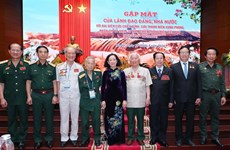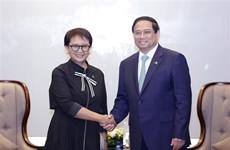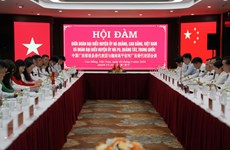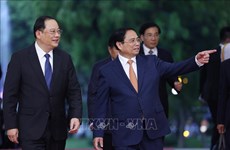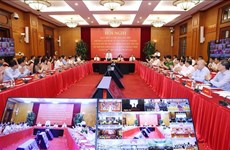Top legislator’s France visit to bolster bilateral cooperation
The official visit to France by National Assembly Chairwoman Nguyen Thi Kim Ngan from March 30 to April 3 will help tighten friendship and cooperation between the two countries, Vietnamese Ambassador to France Nguyen Thiep affirmed in an interview granted to Paris-based correspondents of the Vietnam News Agency.
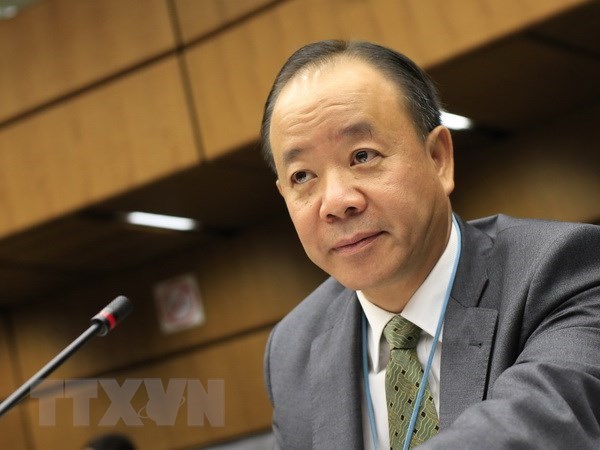 Vietnamese Ambassador to France Nguyen Thiep (Source: AFP)
Vietnamese Ambassador to France Nguyen Thiep (Source: AFP) Paris (VNA) – The official visit to France by National
Assembly Chairwoman Nguyen Thi Kim Ngan from March 30 to April 3 will help
tighten friendship and cooperation between the two countries, Vietnamese
Ambassador to France Nguyen Thiep affirmed in an interview granted to Paris-based
correspondents of the Vietnam News Agency.
Thiep said that the visit is the follow-up of a high-level dialogue framework between leaders of the two countries, which was opened from the official visit to France by Party General Secretary Nguyen Phu Trong a year ago, and then the official visit to Vietnam by French Prime Minister Edouard Philippe in November 2018.
French President Emmanuel Macron is expected to visit Vietnam after Ngan’s visit, Thiep said, adding that the maintenance of the high-level dialogue will be a catalyst for the development of bilateral ties.
The ambassador said that Ngan’s visit also aims to foster the economic cooperation between Vietnam and France.
The top Vietnamese legislator will attend the closing ceremony of a cooperation conference between the two countries’ localities in Toulouse. Her presence shows the Vietnamese Party and State’s wish to boost bilateral economic ties, including relations between the localities.
She is also scheduled to take part in several meetings between parliamentarians and entrepreneurs, which are considered chances to step up trade exchange, particularly as the EU-Vietnam Free Trade Agreement (EVFTA) is about to be approved and signed this year.
The visit also demonstrates the attention paid by the Party and State to the 300,000-strong Vietnamese community in France.
A series of activities to promote parliamentary cooperation – one of the important pillars of bilateral relations – will be held within the framework of the visit, the diplomat stated.
Ngan will hold discussions with friendship parliamentarian groups of the two nations to intensify their engagement in bilateral economic collaboration.
French parliamentarians represent their localities, and as such pay particular attention to expanding cooperation in the fields their localities hold strengths in, including urban management, climate change response, healthcare, education, and training, Thiep added.–VNA
Thiep said that the visit is the follow-up of a high-level dialogue framework between leaders of the two countries, which was opened from the official visit to France by Party General Secretary Nguyen Phu Trong a year ago, and then the official visit to Vietnam by French Prime Minister Edouard Philippe in November 2018.
French President Emmanuel Macron is expected to visit Vietnam after Ngan’s visit, Thiep said, adding that the maintenance of the high-level dialogue will be a catalyst for the development of bilateral ties.
The ambassador said that Ngan’s visit also aims to foster the economic cooperation between Vietnam and France.
The top Vietnamese legislator will attend the closing ceremony of a cooperation conference between the two countries’ localities in Toulouse. Her presence shows the Vietnamese Party and State’s wish to boost bilateral economic ties, including relations between the localities.
She is also scheduled to take part in several meetings between parliamentarians and entrepreneurs, which are considered chances to step up trade exchange, particularly as the EU-Vietnam Free Trade Agreement (EVFTA) is about to be approved and signed this year.
The visit also demonstrates the attention paid by the Party and State to the 300,000-strong Vietnamese community in France.
A series of activities to promote parliamentary cooperation – one of the important pillars of bilateral relations – will be held within the framework of the visit, the diplomat stated.
Ngan will hold discussions with friendship parliamentarian groups of the two nations to intensify their engagement in bilateral economic collaboration.
French parliamentarians represent their localities, and as such pay particular attention to expanding cooperation in the fields their localities hold strengths in, including urban management, climate change response, healthcare, education, and training, Thiep added.–VNA






